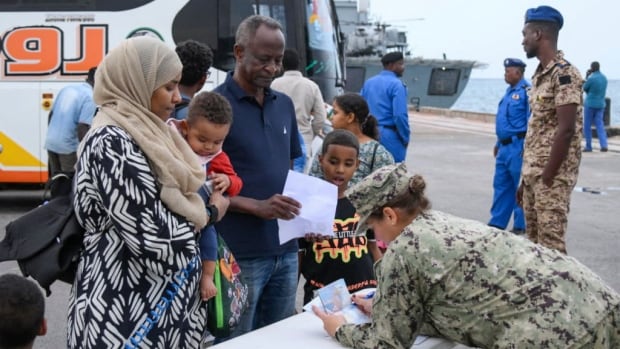The United Nations warned on Monday that 800,000 people may flee Sudan as rival military factions battled in the capital despite a supposed ceasefire and foreign states wound down evacuations.
Hundreds of people have been killed and thousands wounded over 16 days of battles since disputes between the Sudanese army and the paramilitary Rapid Support Forces (RSF) erupted into conflict on April 15.
There seems little prospect of a quick resolution to the crisis, which has damaged swaths of the capital Khartoum, risked drawing in regional powers, and reignited conflict in the Darfur region.
Both warring sides agreed on Sunday to extend a much-violated truce by 72 hours. But airstrikes and artillery rang out on Monday as smoke hung over Khartoum and neighbouring cities.
UN refugee deputy chief Raouf Mazou said his agency was planning for an exodus of 815,000 people, including 580,000 Sudanese as well as foreign refugees now living in the country. Some 73,000 have already left Sudan, he said.
Abdou Dieng, the UN humanitarian co-ordinator in Sudan, warned on Monday that the humanitarian crisis in the country was turning into a “full-blown catastrophe.” He said civilians were taking refuge in parts of Sudan less affected by fighting or fleeing to neighbouring countries, raising the risk of a “regional spillover effect of the crisis.”
The top UN official in Sudan, Volker Perthes, also warned of a “major humanitarian crisis” as people were running out of food and fresh water in Khartoum and the fighting has damaged water systems.
Jamila, a woman still in Khartoum with her family, is only eating one meal a day because so little food is available. RSF troops are stationed in front of their house and refuse to leave. “The sound of fighting is in our ears all day,” she said.
Egypt said 40,000 Sudanese have crossed its border, while others have gone to Chad, South Sudan, and Ethiopia, or journeyed over the Red Sea on evacuation boats.
Some internally displaced Sudanese are congregating in hubs such as Atbara northeast of Khartoum while they work out plans or head for the Egypt and Chad borders.
More than 70,000 South Sudanese refugees who had been living in Khartoum have fled to the country’s neighbouring White Nile province, settling in already overcrowded camps, said Mustafa Amr Abarou, a spokesperson for the Sudanese refugee agency.
At least 10 trucks a day of people fleeing Khartoum continue to arrive, straining the agency’s abilities, he said. Sudan hosts more than 1.3 million refugees, including 800,000 from South Sudan, according to the UN figures.
Sudanese venturing onto the streets at home have described scenes of desolation.
“We saw dead bodies. The industrial area that was all looted. We saw people carrying TVs on their backs and big sacks looted from factories,” said Khartoum resident Mohamed Ezzeldin.
Many fear for their lives in the power struggle between the army chief and RSF head, who had shared control of government after a 2021 coup but fell out over a planned transition to civilian rule.
At least 528 people have been killed and 4,599 wounded, the Health Ministry said. The United Nations has reported a similar number of dead but believes the real toll is much higher.
Sudan’s capital has turned into a war zone as two rival factions battle for control, but other countries are also playing a role. McGill Associate Professor Khalid Medani and War Child Canada President Samantha Nutt break down how outside forces are also helping fuel the fight.
Foreign governments have pulled out their citizens over the past week in a series of operations by air, sea and land, though several countries have ended efforts.
Those remaining face hardship and danger.
“I show up to work for two or three hours then I close up because it’s not safe,” said Abdelbagi, a barber in Khartoum who said he had to keep working as prices were rising.
Hospitals under siege
Many hospitals in the capital remained out of service or inaccessible because of the fighting, while others have been occupied by the warring factions, particularly the RSF, said Atiya Abdalla Atiya, secretary of Sudan’s Doctors’ Syndicate, which is tracking civilian causalities.
More than two-thirds of hospitals in areas with active fighting are reported to be out of service, with fighters looting the dwindling supplies.
The UN and other aid organizations have cut services, though the World Food Program said it was resuming operations in more secure areas on Monday after staff were killed early in the war.

The UN fears for the war’s impact both on Sudan and the broader region, said Martin Griffiths, a senior official for humanitarian and emergency relief matters, warning the country was at “breaking point.”
“The scale and speed of what is unfolding in Sudan is unprecedented,” said Griffiths, who will visit Sudan on Tuesday. Agencies are importing supplies through Port Sudan, but need security guarantees to take them on to Khartoum.
Ceasefire violations continue
Both sides said on Monday they were making progress without commenting directly on the ceasefire violations.
Talks on a sustained ceasefire could take place in either Saudi Arabia or South Sudan, said Perthes, speaking from Port Sudan. He said the former may be easier logistically, though each side would need safe passage through the other’s territory. “That is very difficult in a situation where there is a lack of trust,” he said.
Canada has suspended its evacuation operation at a Khartoum airfield after a ceasefire unravelled and violence escalated, but Canadians are still stranded in Sudan and escape options are limited.
The army said it had cut RSF’s combat effectiveness by half and stopped it trying to reinforce its positions in the capital. The RSF said it still controls main locations of Khartoum and was itself beating back army reinforcements.
News agencies could not verify either side’s claims.




